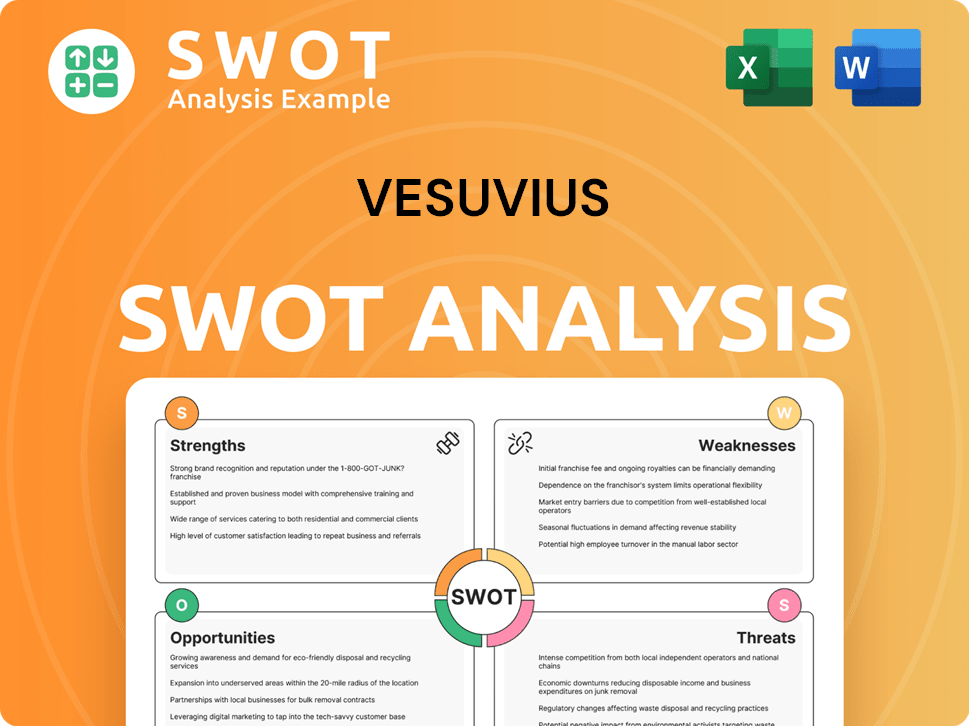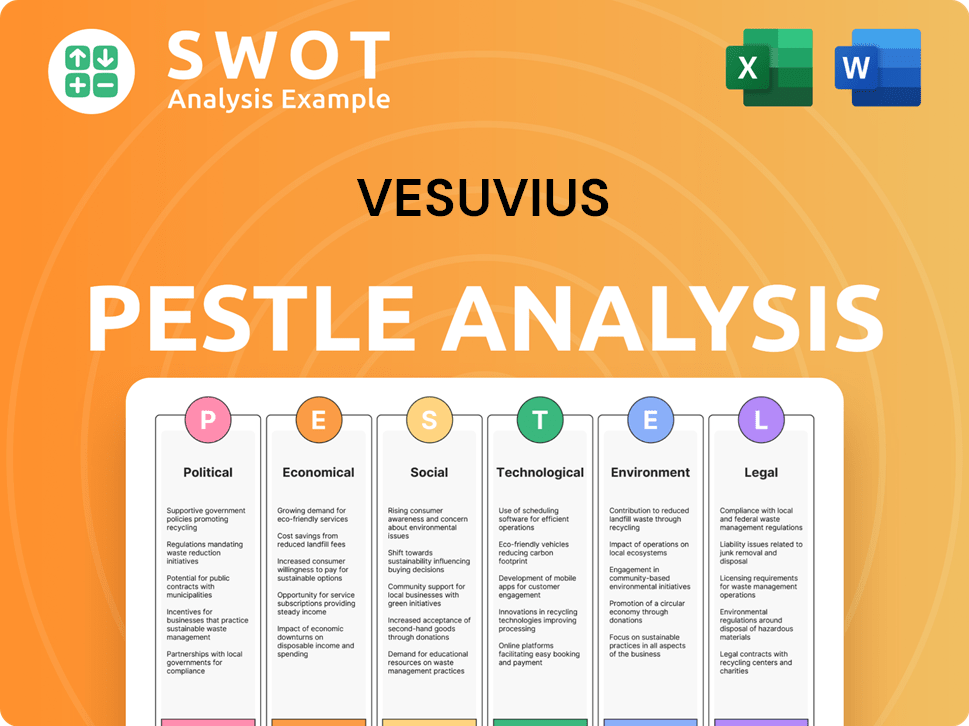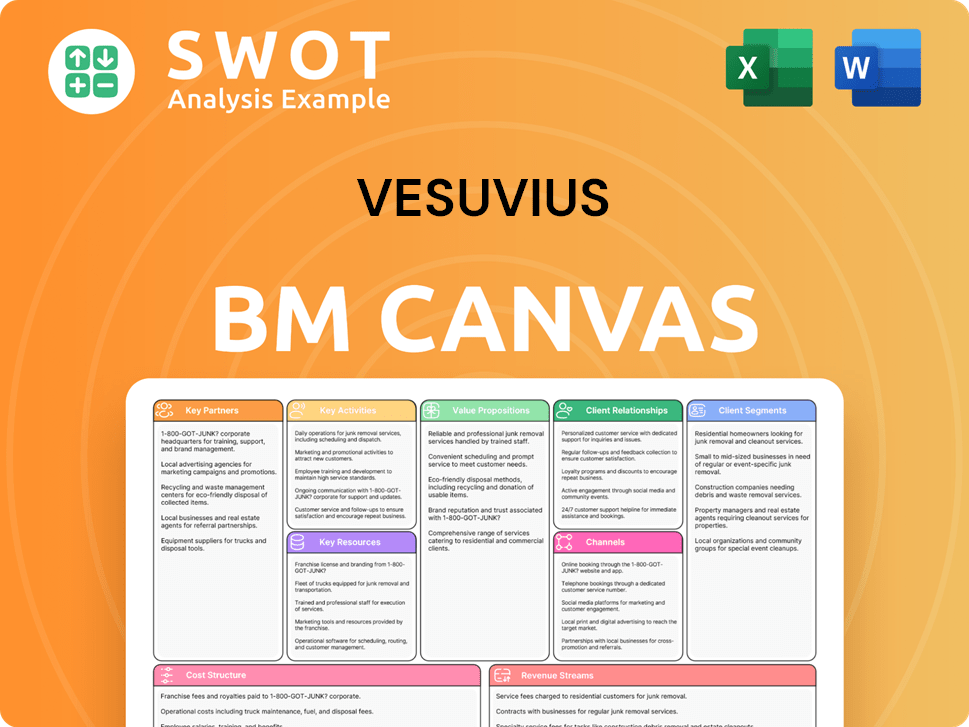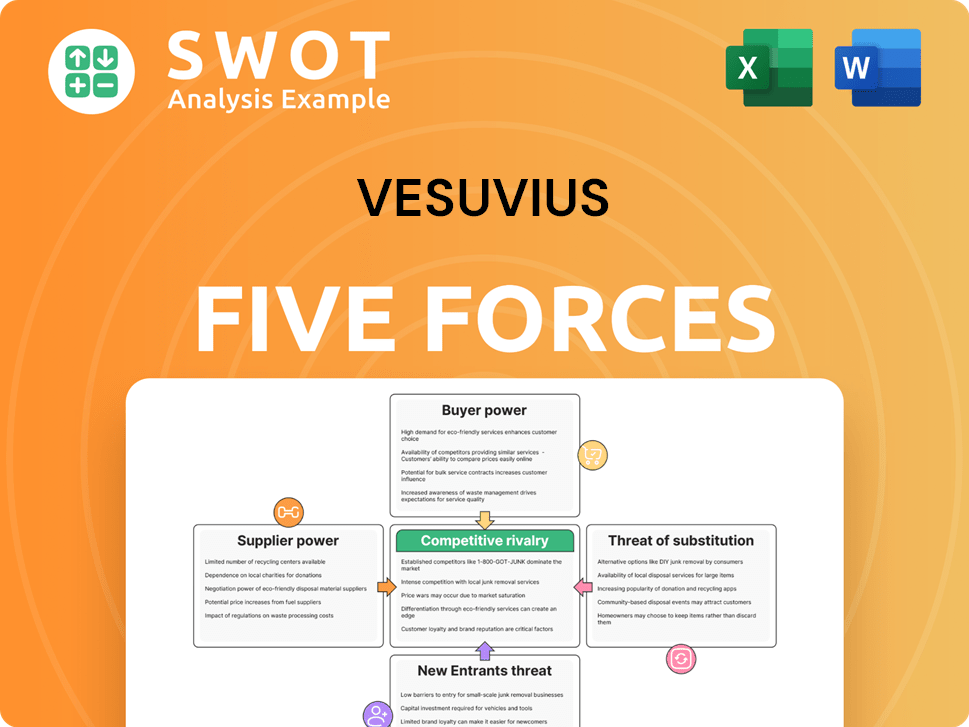Vesuvius Bundle
How Does Vesuvius Forge Its Path to Market Dominance?
Vesuvius, a titan in molten metal flow engineering, isn't just about melting metal; it's about melting away the competition. Their Vesuvius SWOT Analysis reveals a sales and marketing strategy finely tuned to the demands of the steel and foundry sectors. This article dives deep into the innovative approaches that have solidified Vesuvius's position as a global leader.

Understanding the Vesuvius sales strategy is crucial, especially considering its sustained investment in R&D, which has led to a stream of new products. Explore the Vesuvius marketing strategy and discover how the company navigates a competitive landscape. This analysis will also examine Vesuvius's business model, offering insights into its market analysis and competitive advantage, including how it targets its audience and optimizes its sales process for sustained growth in global markets.
How Does Vesuvius Reach Its Customers?
The sales channels of the company are primarily built around direct sales teams and a network of manufacturing plants strategically located near its customers. This approach allows the company to embed industry experts within customer operations. This strategy is crucial for providing direct technical assistance and cultivating strong, long-term relationships. The company's focus is on business-to-business (B2B) sales, targeting major steel producers and foundries worldwide.
The evolution of these sales channels reflects the company's strategic emphasis on gaining market share and expanding its presence in growing regions. A key example is the ongoing strategic expansion program in Flow Control globally and in Advanced Refractories and Foundry in Asia, which is expected to be finalized by mid-2025. This expansion supports increased flow control consumable sales and development in key areas like India, Southeast Asia, and EMEA. In 2024, the company secured nine new contracts, a significant increase from the five contracts signed in 2023, which are expected to boost flow control consumable sales in the coming years.
While the company primarily relies on an offline, direct sales model, it also uses its company website for investor information, annual reports, and sustainability reports. This indicates a digital presence for stakeholder engagement. Strategic partnerships and acquisitions also play a significant role in the company's sales and marketing strategy. The acquisition of PiroMet, completed in early 2025, is set to strengthen the company's position in the growing EEMEA (Eastern Europe, Middle East, and Africa) market, particularly in Turkey, the Middle East, and North Africa, complementing its robotics strategy. These strategic shifts and partnerships contribute to the company's ability to gain market share even in challenging market conditions. For more insights into the company's financial performance and ownership structure, consider exploring the information available on Owners & Shareholders of Vesuvius.
The company's sales strategy centers on direct sales teams and a global network of plants. This allows for direct technical support and strong customer relationships. The focus is on B2B sales to major steel producers and foundries.
The marketing strategy involves strategic expansion in key regions, like Asia and EMEA. Acquisitions, such as PiroMet, enhance market presence. The company leverages its website for stakeholder engagement.
The company's business model is primarily B2B, serving the steel and foundry industries. This model is supported by direct sales and a global manufacturing footprint. The company's focus is on providing specialized products and services.
Market analysis shows growth opportunities in regions like Asia and EEMEA. The company's expansion efforts are designed to capitalize on these opportunities. Strategic acquisitions support market share growth.
The company's sales strategy emphasizes direct customer engagement and global reach. The marketing strategy focuses on strategic expansions and partnerships to drive market share gains.
- Direct sales teams are a primary channel for customer engagement.
- Expansion in regions like Asia and EEMEA is a key focus.
- Acquisitions, such as PiroMet, enhance market presence.
- The company secured nine new contracts in 2024.
Vesuvius SWOT Analysis
- Complete SWOT Breakdown
- Fully Customizable
- Editable in Excel & Word
- Professional Formatting
- Investor-Ready Format

What Marketing Tactics Does Vesuvius Use?
The Vesuvius sales strategy and marketing strategy are centered on demonstrating technological leadership and value to its industrial clients. This approach emphasizes content marketing, leveraging expertise in molten metal flow engineering. The company's commitment to innovation is evident through its product launches, with 33 new products introduced in 2024.
Vesuvius's marketing tactics also include digital engagement, particularly through its website for investor relations, where it disseminates crucial information such as annual reports and financial results. The company uses digital platforms for broader reach, as seen with its annual general meetings that offer webinar access. This highlights a focus on stakeholder engagement and transparency.
Data-driven marketing and customer segmentation are implied through its market share gains in divisions like Flow Control and Foundry, indicating a targeted approach to its customer base. The company's robust R&D investment, maintained at approximately 2% of sales, supports its marketing efforts by providing a continuous pipeline of innovative products.
Vesuvius utilizes content marketing to showcase its expertise in molten metal flow engineering. This includes publishing sustainability reports that highlight how its products and engineering solutions help customers improve operational performance.
The company uses its website for investor relations, providing timely information like annual reports. It also employs digital platforms, such as webinars, for broader stakeholder engagement.
Vesuvius emphasizes innovation, having launched 33 new products in 2024. This demonstrates its commitment to meeting evolving customer needs and maintaining a competitive edge in the market.
The company focuses on market share gains in specific divisions, such as Flow Control and Foundry. This indicates a targeted approach to its customer base and a data-driven strategy.
Vesuvius maintains robust R&D investment, approximately 2% of sales. This supports its marketing efforts by providing a continuous pipeline of innovative products that address customer challenges.
The company's sustainability reports highlight how its products and engineering solutions contribute to reducing energy waste and producing more advanced steel grades. This aligns with industry trends towards decarbonization.
Vesuvius's marketing objectives center on demonstrating technological differentiation, driving market share gains, and supporting customer needs through innovation. The company aims to enhance its brand positioning by showcasing its commitment to sustainability and providing solutions that improve operational performance.
- Increase market share in key divisions like Flow Control and Foundry.
- Highlight the benefits of its refractory products in reducing energy waste.
- Promote the launch of new products, with 33 new products in 2024.
- Utilize digital channels for investor relations and stakeholder engagement.
Vesuvius PESTLE Analysis
- Covers All 6 PESTLE Categories
- No Research Needed – Save Hours of Work
- Built by Experts, Trusted by Consultants
- Instant Download, Ready to Use
- 100% Editable, Fully Customizable

How Is Vesuvius Positioned in the Market?
The brand positioning of the company, a global leader in molten metal flow engineering, is centered around innovation and sustainability. Their core message emphasizes 'thinking beyond today' to create solutions for the future. This approach is crucial for their Vesuvius sales strategy and Vesuvius marketing strategy, helping them stand out in the market.
The company's strategy focuses on providing technology-led products and engineering solutions. These solutions address complex challenges in industrial processes, enhancing safety, efficiency, and sustainability. This commitment to innovation is a key element of their Vesuvius company strategy, allowing them to meet evolving customer needs and maintain a competitive edge.
They differentiate themselves through technological advancements and strong customer relationships, supported by a global network. This is particularly important in the context of their Vesuvius business model and Vesuvius market analysis. The company's commitment to sustainability and innovation, demonstrated by 33 new product launches in 2024, aligns with industry trends, supporting their goals for decarbonization and higher-performance metal manufacturing.
The company leverages its technological advancements to provide unique solutions in molten metal flow engineering. This focus on innovation is central to their Vesuvius competitive advantage and enables them to meet specific customer needs.
Strong customer relationships are facilitated by a global network of manufacturing plants and embedded industry experts. This approach supports their Vesuvius sales strategy for refractory products by ensuring close collaboration and tailored solutions.
With a target to reach net zero CO2e emissions by 2050, the company is responding to the increasing demand for decarbonization. This is a key element of their Vesuvius marketing strategy for the steel industry.
The company's commitment to safety is evident in its record Lost Time Injury Frequency Rate (LTIFR) of 0.52 per million hours worked in 2024. This focus on operational excellence supports their Vesuvius company strategy in global markets.
The company demonstrates brand consistency in its investor relations and sustainability reporting. This includes external recognition, such as an AA rating from MSCI and a silver medal from EcoVadis in 2024. This consistent messaging and commitment to key values help the company maintain its competitive edge and respond to evolving customer needs. For more insights into their target audience, explore the Target Market of Vesuvius.
- How does Vesuvius approach sales? Through technological differentiation and strong customer relationships.
- What are Vesuvius's marketing objectives? To emphasize innovation and sustainability.
- Vesuvius's strategy for customer relationship management: A global network and embedded industry experts.
- Vesuvius's digital marketing initiatives: Focus on sustainability and innovation through new product launches.
Vesuvius Business Model Canvas
- Complete 9-Block Business Model Canvas
- Effortlessly Communicate Your Business Strategy
- Investor-Ready BMC Format
- 100% Editable and Customizable
- Clear and Structured Layout

What Are Vesuvius’s Most Notable Campaigns?
The core of Vesuvius's sales strategy and marketing efforts centers on continuous initiatives rather than isolated campaigns. As a B2B industrial entity, the company focuses on long-term strategies that drive sustainable growth and maintain its competitive edge. Key strategies include ongoing investments in research and development and a global strategic expansion program.
A primary driver of Vesuvius's marketing strategy is its commitment to innovation. This is demonstrated through consistent investments in R&D and the launch of new products. These product introductions are designed to enhance efficiency, productivity, and sustainability for its customers, solidifying Vesuvius's market position.
Another crucial aspect of Vesuvius's company strategy involves strategic expansion, particularly in high-growth regions. This expansion aims to increase market share and sales in key areas. Furthermore, cost reduction programs are implemented to support sales and marketing efforts by enabling competitive pricing and maintaining profitability, even in challenging market conditions.
Vesuvius consistently invests in Research & Development, resulting in a significant number of new product launches. In 2024, the company launched 33 new products, exceeding the previous year's figures. The new product sales ratio reached 19.1%, approaching its long-term goal of 20%. These launches aim to provide technologically advanced solutions, improving efficiency, productivity, and sustainability for customers.
A key component of Vesuvius's strategy is its global strategic expansion program, particularly in regions like India and Southeast Asia. This initiative aims to increase market share in high-growth areas. In 2024, Vesuvius secured nine new contracts, up from five in 2023, which are expected to boost future flow control consumable sales. This expansion is largely completed by mid-2025.
Vesuvius has implemented an accelerated cost reduction program, targeting savings of £45-55 million by 2028. This program supports sales and marketing by enabling competitive pricing and maintaining profitability. In 2024, the company achieved £13 million in cost savings, with an annualized exit run-rate of £18 million. This robust operational performance, combined with resilient pricing and market share gains, has allowed Vesuvius to deliver stable results despite weak end markets.
Vesuvius's focus is on offering technologically differentiated solutions to drive market share gains and maintain superior pricing. This strategy is evident in its investment in R&D and the introduction of innovative products such as Supergard Oxygen Barrier Lining and Basilite Quick Start. The goal is to provide superior products that enhance customer efficiency and sustainability.
Vesuvius Porter's Five Forces Analysis
- Covers All 5 Competitive Forces in Detail
- Structured for Consultants, Students, and Founders
- 100% Editable in Microsoft Word & Excel
- Instant Digital Download – Use Immediately
- Compatible with Mac & PC – Fully Unlocked

Related Blogs
- What are Mission Vision & Core Values of Vesuvius Company?
- What is Competitive Landscape of Vesuvius Company?
- What is Growth Strategy and Future Prospects of Vesuvius Company?
- How Does Vesuvius Company Work?
- What is Brief History of Vesuvius Company?
- Who Owns Vesuvius Company?
- What is Customer Demographics and Target Market of Vesuvius Company?
Disclaimer
All information, articles, and product details provided on this website are for general informational and educational purposes only. We do not claim any ownership over, nor do we intend to infringe upon, any trademarks, copyrights, logos, brand names, or other intellectual property mentioned or depicted on this site. Such intellectual property remains the property of its respective owners, and any references here are made solely for identification or informational purposes, without implying any affiliation, endorsement, or partnership.
We make no representations or warranties, express or implied, regarding the accuracy, completeness, or suitability of any content or products presented. Nothing on this website should be construed as legal, tax, investment, financial, medical, or other professional advice. In addition, no part of this site—including articles or product references—constitutes a solicitation, recommendation, endorsement, advertisement, or offer to buy or sell any securities, franchises, or other financial instruments, particularly in jurisdictions where such activity would be unlawful.
All content is of a general nature and may not address the specific circumstances of any individual or entity. It is not a substitute for professional advice or services. Any actions you take based on the information provided here are strictly at your own risk. You accept full responsibility for any decisions or outcomes arising from your use of this website and agree to release us from any liability in connection with your use of, or reliance upon, the content or products found herein.